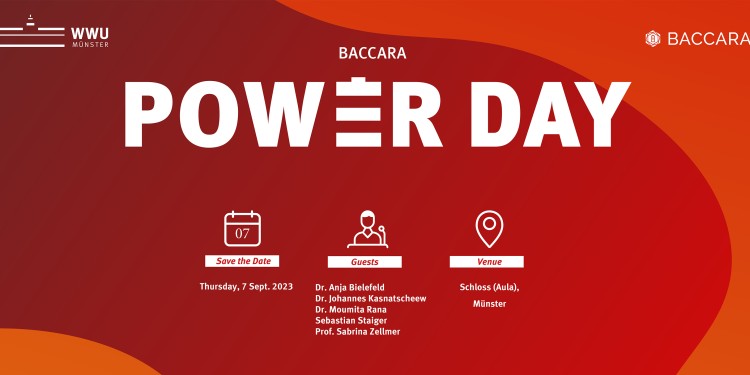
“This format makes networking easier”
At the BACCARA Power Day, which takes place on Thursday September 7 at the University of Münster, around 120 guests from science and industry will be meeting to discuss about current issues in the field of battery research. The Power Day is an event organised by the BACCARA International Graduate School at the University of Münster. Simon Albers is a BACCARA doctoral student at the MEET Battery Research Centre and he and other BACCARA PhD students helped in organising the conference. In this interview with Christina Hoppenbrock he talks about what the programme will involve.
What is this year’s Power Day about?
We have a wide range of talks covering all sorts of topics to do with batteries; for example, solid-state batteries and recycling, and questions relating to battery cell chemistry, as well as theoretical work being done such as modelling and simulations. We’ll also be taking a look at the E-Lyte Innovations company, a spin-off from the MEET Battery Research Centre which specialises in the production of electrolytes.
Who are the speakers we can expect?
They include aspiring young researchers from both the University of Münster and other universities, as well as a woman speaker from industry.
The BACCARA PhD students also helped to organise the event, right?
Exactly. This was the first time I was involved, and it was a completely new experience. For example, organising the talks was more work than I expected, because you always get people cancelling and a new list of speakers repeatedly has to be drawn up. It was an interesting experience for me in addition to doing my dissertation.
What’s special about this particular event?
The Power Day is smaller and less complex than other battery conferences. That makes networking easier, and it also makes it easier to discuss with other researchers. The poster session gives a good overview of the dissertations which the other BACCARA PhD students are engaged on, and they also provide suggestions on who you can contact to collaborate on topics together. Research groups meet here that don’t otherwise have much contact with one another. The event enables us all to take a broader view, outside our own fields of research.
Some of the topics covered in the BACCARA research programme are from the fields of materials research, molecular chemistry, electrochemistry and research into battery cells and catalysis. One component is theoretical chemistry, taking in modern information technologies including data analysis, simulations and machine learning, artificial intelligence and the networking of humans and machines. A total of 45 doctoral students from the fields of chemistry and materials sciences are involved in BACCARA. The state of North Rhine-Westphalia is providing funding for the BACCARA International Graduate School: 9.5 million euros over a period of five years.
